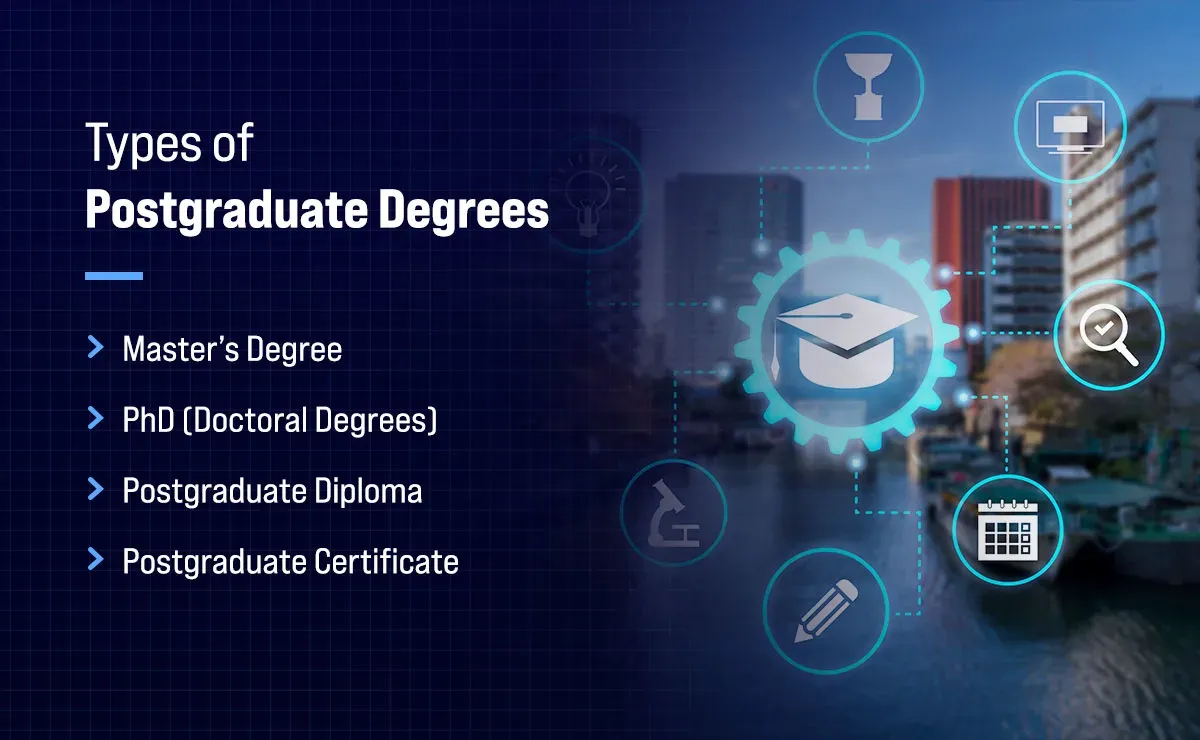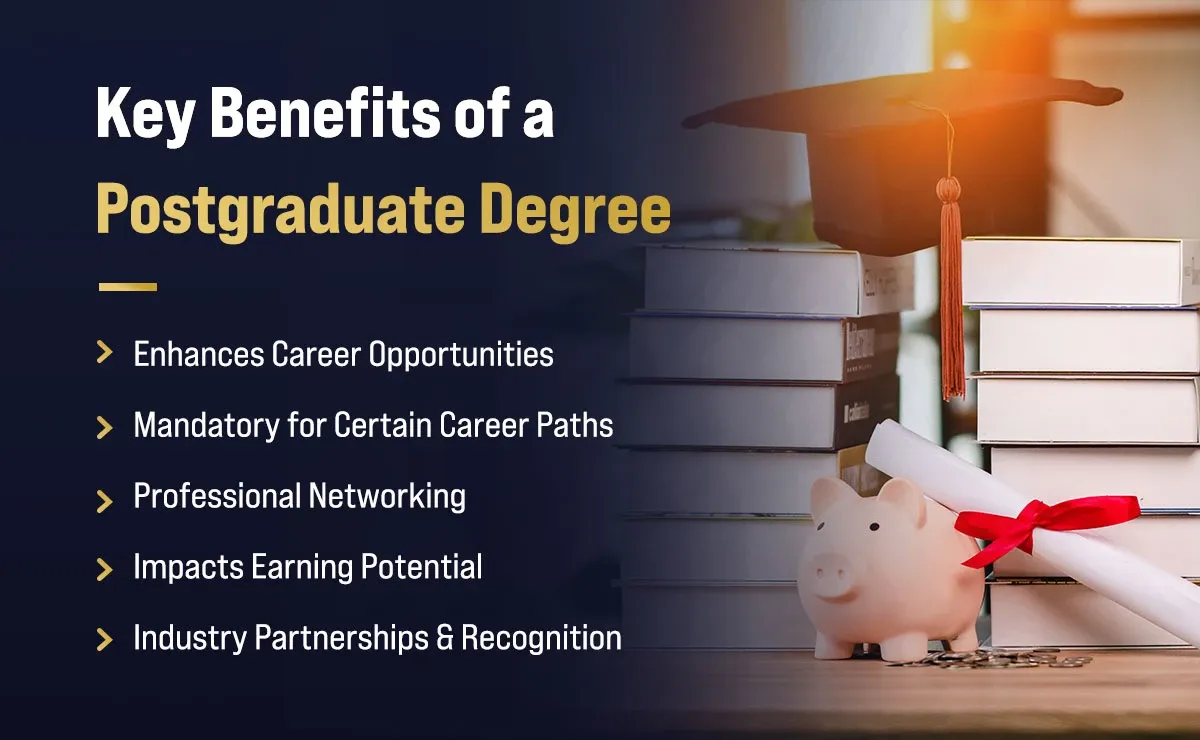What is Post Graduation?

There is a major shift in postgraduate education in India, where the traditional academic approach is approaching a new frontier: post graduation education is becoming flexible, integrative in terms of skills, and globalized. (Here post graduate meaning is evolving from purely theoretical learning to industry-aligned, skills-first programs.)
This level of education is characterized by courses such as master's degrees, diplomas/certificates (postgraduate), and doctorates, which are essential for specialization and career advancement.
Whether you are a recent graduate, working professional, or exploring career transitions, understanding the postgraduate landscape can help you make better academic and career decisions.
Regardless of your interest in academia, career, or entrepreneurship, postgraduate education offers you an opportunity to follow where your ambitions go. This paper discusses all you must know about post-graduation, its nature, advantages, and how to make the correct decision to pursue your objectives.
Post-graduation is the next step after completing a bachelor’s degree, offering advanced knowledge and specialized skills in a chosen field. At Altera Institute, students gain hands-on experience and industry insights, preparing them for higher-level roles and improving placement opportunities. See how our programs help you grow academically and professionally.
What is Post Graduation?
A postgraduate degree (or post graduation) is an advanced academic qualification that can be pursued after completing a bachelor's. In India, this typically refers to a master’s-level program (often lasting 2 years) or higher.
The purpose of this academic model is to deepen knowledge or specialize in a field. It is equally valuable for students and working professionals seeking to upskill, change career paths, or advance in leadership roles. Compared to graduation, postgraduate study involves more focused, higher‑level learning and often includes research or practical projects.
Types of Postgraduate Degrees
In India, common postgraduate qualifications include master’s degrees, doctoral degrees (PhDs), postgraduate diplomas, and postgraduate certificates. Each of these academic models serves different goals:

Master’s Degree
The most widely awarded postgraduate degree in India is the masters. The programs are typically a two-year, full-time course divided into four semesters, with specializations including Master of Arts, Master of Science, Master of Business Administration, Master of Technology, and Master of Commerce.
At the master's degree level, programs combine theoretical and practical research, typically concluding with a thesis or capstone project. This approach enables students to master theoretical knowledge while acquiring industry-relevant skills.
The overall design of these programs is aimed at ensuring that graduates possess the depth of knowledge and practical competence necessary to be placed in a specialized position and have the ability to lead in their respective fields.
PhD (Doctoral Degrees)
A Doctor of Philosophy is the highest academic degree, and it is more oriented to original research. PhDs are typically pursued after earning a master's degree and can take three to five years to complete, although this timeframe can be extended to seven years, depending on the level of research and the field's specific needs.
PhD applicants are expected to exhibit superior academic qualifications, and in most cases, they must have achieved a qualifying result in a national examination, such as UGC-NET, CSIR-NET, or GATE. The qualification equips graduates with the ability to work in academic research, university teaching, and technical positions in the high-level industry.
Postgraduate Diploma
Postgraduate diplomas provide focused, practical education without requiring a full master's degree commitment. These programs typically last one to two years and emphasize specialized skills in areas such as management, computer applications, digital marketing, and other technical specializations.
Postgraduate diploma programs are applied and vocational and tend to be industry-oriented rather than traditional master's degrees. These programs are offered by institutions recognized by AICTE or other regulatory authorities, ensuring they are of high quality and industry recognized. This is the case with the Postgraduate Diploma in Management, which is recognized by professional organizations as equivalent to an MBA.
Postgraduate Certificate
Postgraduate certificates are the shortest type of postgraduate education, typically taking between six and twelve months. These programs are highly specialized, focusing on developing specialized skills in specific fields, including digital marketing, finance, journalism, and data analytics. Their concentrated format makes them particularly appealing to working professionals seeking to update their skills or gain proficiency in emerging fields without prolonged career breaks.
Postgraduate certificates are cost-effective, rapid in obtaining skills, and emphasize contemporary industry trends. They are the best alternatives when a professional wants to upgrade their qualifications in a particular field or venture into new areas before deciding to undertake more serious education programs.

The Distinction Between Undergraduate and Postgraduate.
Here are the differences between the two:
Aspect | Undergraduate Program | Postgraduate Program |
Definition | An undergraduate degree serves as the foundational tier of higher education, accessible after completing Class 12 (10+2) schooling. | A postgraduate program is an advanced level of study undertaken after completing an undergraduate degree. |
Eligibility | Requires successful completion of Class 12 (Senior Secondary) from a recognized board | Requires a bachelor’s degree (undergraduate) in a relevant or any field, depending on the program. |
Purpose | Offers foundational knowledge in a broad subject area and helps students explore career interests. | Aims to deepen expertise in a specialized field or subject to prepare for research, industry, or academia. |
Academic Rigor | Moderate to high, depending on the course where students are introduced to core concepts. | Renowned for its intensity, postgraduate education demands critical analysis, deep subject expertise, and the ability to translate theory into practice. |
Employability | Offers basic employability as skill gaps are often observed without further specialization. Suitable for entry-level roles in various industries | Better employability and earning potential due to higher qualifications. Opens doors to higher-level leadership positions, promotions, and academic careers. |
Cost of Study | Lower than postgraduate programs. Many colleges offer subsidized tuition in public institutions. | Higher, and hence may require scholarships, student loans, or personal investment to pursue. |
Examples of Degrees | BA, BSc, BCom, BBA, BTech, LLB (5-year integrated), BCA, etc. | MA, MSc, MTech, MBA, MCom, PGDM, PGP, PhD, etc. |
Admission Requirements in Postgraduate Programs
Eligibility for postgraduate programs in India varies by institution, course of study, and program type, although there are standard eligibility requirements that apply across the board. The first requirement of all postgraduate programs is that one should have a recognized undergraduate degree from a recognized university. The programs may be more specific to individuals, especially in technical or research-intensive fields.
General Eligibility Criteria:
Bachelor’s Degree Completion: A recognized undergraduate qualification is required. The relevance of your undergraduate discipline depends on the postgraduate program. For example:
- MSc or MTech programs typically require a background in science or engineering.
- MBA programs accept graduates from any stream, but often prefer work experience for executive programs.
Minimum Academic Performance:
- The majority of institutions require a minimum of 50 percent and 60 percent in undergraduate studies.
- Mark concessions for reserved category candidates (SC/ST/OBC), adhering to governmental policies.
Entrance Examinations:
Competitive entrance tests are often a key part of the admission process, especially for sought-after programs and premier institutes:
Management Programs:
- CAT (Common Admission Test)
- XAT (Xavier Aptitude Test)
- GMAT (Graduate Management Admission Test – mostly for international or executive programs)
Engineering and Technical Programs:
- GATE (Graduate Aptitude Test in Engineering)
Institution-Specific Tests:
- Several private and state universities administer independent entrance tests for admission into their postgraduate courses.
Other Elements of Evaluation:
In addition to educational background and admission test results, the majority of the institutions apply holistic approaches to evaluate the suitability of a candidate for the program:
- Personal Interview (PI): Measures the subject of knowledge, motivation, and communication skills.
- Group Discussion (GD): This is a common activity in management courses, as it assesses both critical thinking skills and teamwork skills.
- Statement of Purpose (SOP): A reflective writing that explains academic goals, future career goals, and reasons as to why one would join the program.
- Letters of Recommendation (LOR): More relevant to courses with a research-intensive emphasis or international admissions, in which the focus is on the academic and professional competence of the applicant.
PhD Programs: Special Requirements:
Admissions into PhD programs are more demanding and research oriented. Other than having a postgraduate degree, the candidate is normally expected to:
Clear a National Eligibility Exam:
- NET (National Eligibility Test)
- GATE (for engineering research)
- CSIR-UGC NET (for science disciplines)
Apply with a Research Proposal: Applicants have to provide information about the proposed area of research, objectives, and methodology.
Interview with the Research Committee: This can be followed by a presentation and an in-depth discussion to assess the research's aptitude and suitability for the department's expertise.
Is a Postgraduate Degree Worth It?
The worth of a postgraduate degree depends on an individual's career goals, industry expectations, and personal circumstances. Although demanding considerable time, resources, and financial commitment, postgraduate education in India offers significant long-term benefits for students. There are, however, numerous programs, such as the PG programs that have scholarships, fellowships, or are sponsored by the employer - research before you apply.
The Main Advantages of a Postgraduate Degree

Improves Career Visions
Postgraduate degrees tend to open the door to senior or specialized jobs that undergraduate degree holders cannot access. Companies operating in the spheres of management, data science, engineering, and public health are more likely to hire individuals with a higher education level, as it demonstrates their ability to solve problems and work under pressure.
Compulsory for Some Professions
In several professions, postgraduate degrees are not just beneficial—they are required. For example:
- Academic and Research Careers: University-level teaching and research require a PhD, as well as a minimum of a master's degree.
- Technical and Scientific: Preferably, postgraduate qualifications are required in highly technical engineering, pharmaceutical, and biotech positions.
- Legal and Educational Professions: Positions such as law professors or educational policymakers typically require postgraduate-level education.
Professional Networking
Although the learning aspect is always the core component, networking is a significant by-product in most cases and can even be the motivating factor for pursuing a postgraduate degree. When used effectively, such ties can also help students achieve a higher mobility rate in their careers, grow more quickly, and be able to work in a competitive industry or even in an international market.
Impacts Earning Potential
Postgraduate qualifications will always have a higher earning capacity relative to individuals with undergraduate degrees. For example, the salary information of an MBA graduate illustrates the economic returns of postgraduate studies at different institutions and specializations varying. MBAs from leading institutions, including the Indian Institutes of Management (IIMs), have significantly higher average salaries of up to ₹30 LPA, which is indicative of the high brand value and employability that such schools confer.
Industry Partnerships & Recognition
More industries, such as management, technology, and digital marketing, are acknowledging specialized postgraduate education as an essential part of addressing key skill deficits. Such a need has led to the development of postgraduate courses (such as PGPs and PGDMs) that are specifically designed to provide specialized, practical, and industry-relevant education. These are created through the close involvement of industry in curriculum design, mentoring, and live projects, ensuring that graduates are employment-ready from the first day.
Altera Institute’s PGP in Applied Marketing
Recognizing the demand for skills tailored to emerging digital roles, institutions like the Altera Institute exemplify the evolution of postgraduate management education. Their PGP in Applied Marketing demonstrates key trends in specialized program design:
- Curriculum Development: Co-created with industry leaders, from companies like HUL, Mamaearth, and Reckitt, so that it can be relevant to the current marketing challenges.
- Instruction: Taught entirely by practicing CXOs and senior business leaders from over 20 leading companies, bridging academic theory with real-world expertise.
- Pedagogy: Emphasizes practical application through case competitions, business simulations, and live projects with D2C brands such as TheWholeTruth Food, Bombay Shaving Company, and Pilgrim.
This format of the program is indicative of the larger trend toward postgraduate education, with a greater emphasis on industry-based activities and the acquisition of practical skills in digital-first careers.
Summing Up
In India, post-graduation enables you to turn ambition into knowledge. You may be pursuing a master's degree, diploma, certificate, or a specialized course, such as the PGP in Applied Marketing at Altera, but regardless, the qualification you have can open new opportunities, build stronger professional connections, and increase your earning potential.
These higher qualifications not only open up opportunities in leadership and innovative career opportunities but also increase your future gross income. Investing after graduation is a strategic move towards future success for graduates on the verge of securing their careers.





